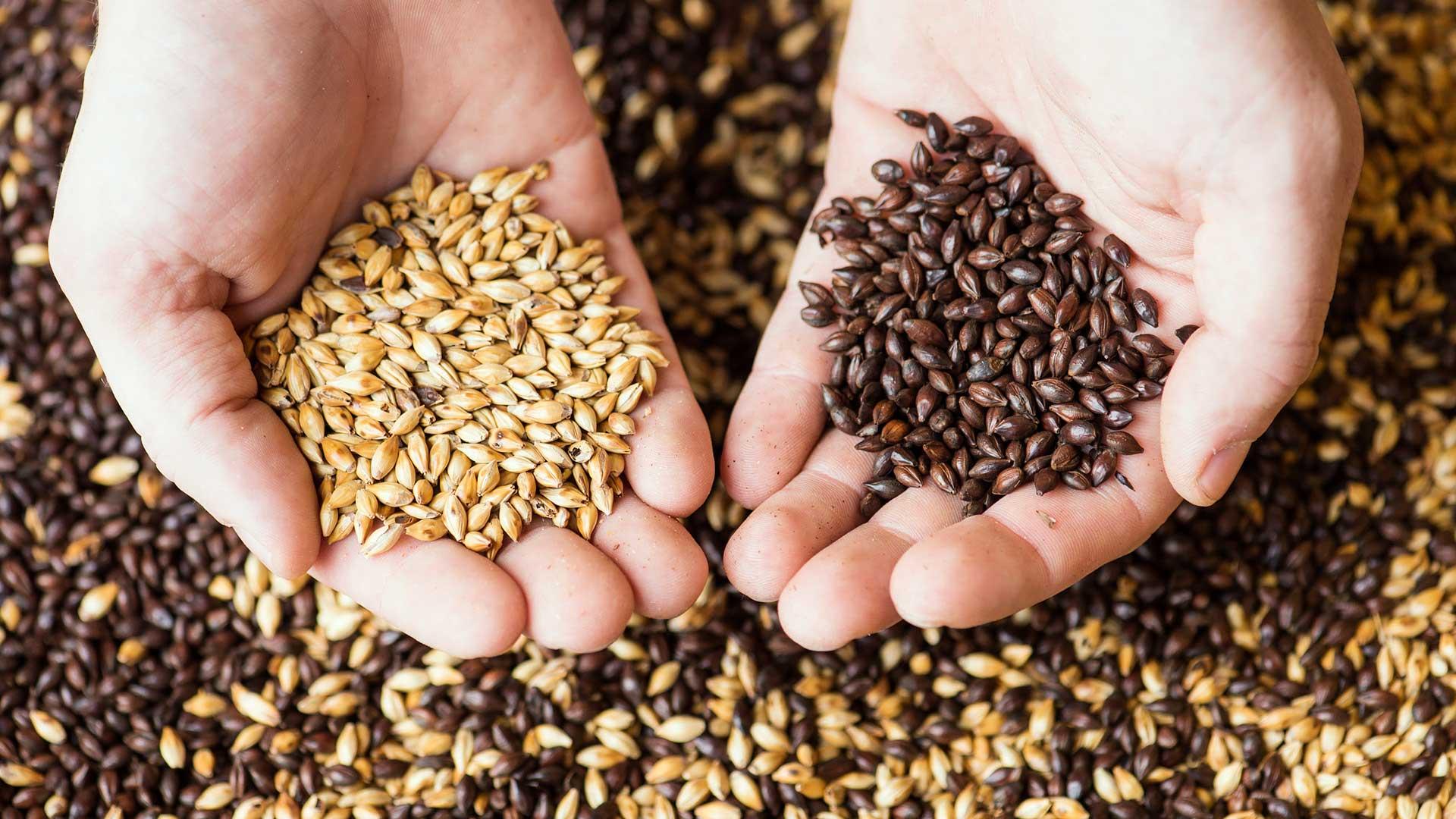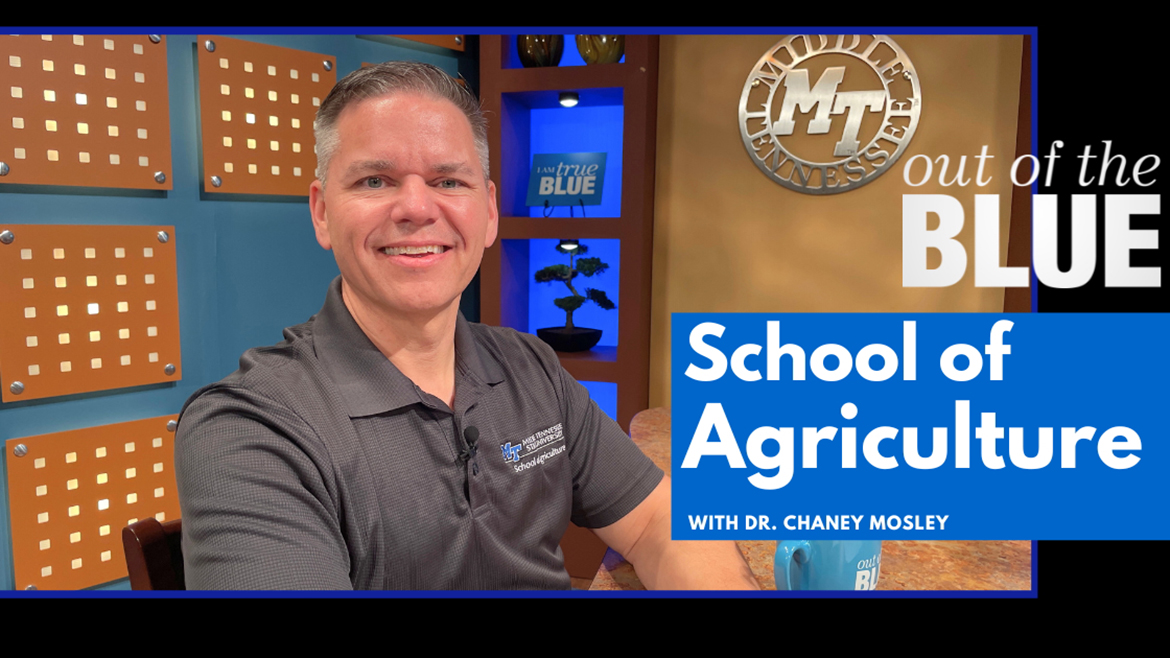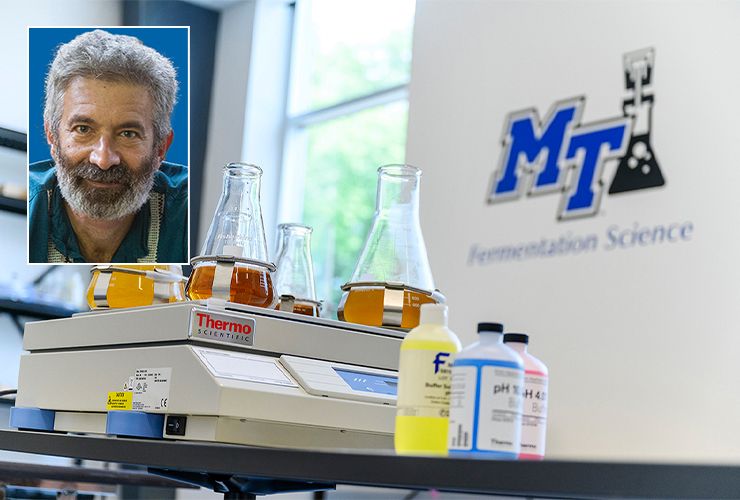
Fermentation Science
A unique program for foods, beverages, with hands-on skills and industry partners. A career so good you can taste it.
Fermentation Science, B.S.
The Bachelor of Science in Fermentation Science is offered through the College of Basic and Applied Sciences at MTSU. The program leading to a Fermentation Science degree is designed for students interested in the science and art of fermentation in all its applications (foods and beverages, industrial chemicals, medications, water treatment, flavors, and aromas). Students will also develop practical research and outreach initiatives to answer questions facing the growing fermentation-related industries in Tennessee, the United States, and the world.
Highlights
- MTSU's Fermentation Science degree is the first degree program of its type in Tennessee and rare in the Southeast region.
- Fermentation is an ideal vehicle to produce highly nutritious and long-term stable foods with unique flavors, textures, and aromas but it is also used in an incredible range of industries to produce medications and industrial chemicals/ingredients.
- Tennessee is home to a large and diverse community of food processors, and the most significant growth has been in the fermented foods segment of this vitally important industry.
- Courses in Fermentation Science are taught in partnership with local companies, and hands-on training sessions are offered at industry sites.
- Students complete internships in industries that utilize fermentation and graduate with highly valuable real-world experience.
- Students have interned with wineries, distilleries, breweries, cheese-making operations, and state governmental agencies within Tennessee, the US and around the world.
- Employment possibilities exist world-wide and demand is very high for our graduates.
Specialty Elective Courses
- Applied Fermentation: Biomass and Biofuels
- Applied Fermentation: Fruits and Vegetables
- Applied Fermentation: Milk, Meat, and Grain
- Brewing, Distilling, and Fermentation Science and Analysis
- Brewing, Distilling, and Fermentation Safety and Sanitation
- Facility Design and Operation
- Food Quality Control
- Food Safety Issues from Production to Consumption
- Legal Issues — Fermentation
- Milk Processing and Marketing
- Principles of Food Processing
- Probiotics, Prebiotics, and Bioprocessing
- Sensory Analysis of Beer
- Value Added Agriculture
- Wine, Beer, and Spirits Industry
- Wine Science and Industry
- World Food and Society
If you live in one of these states: AL KY LA; you may be able to attend MTSU at in-state rates under the Academic Common Market program.
News Briefs

June ‘Out of the Blue’ TV show features MTSU School of Agriculture expansion [+VIDEO]
Chaney Mosley, Middle Tennessee State University School of Agriculture director, outlines the variety of programs, a new data-driven agri-analytics certificate available to students and more in the June edition of “Out of the Blue,” the university’s television magazine show.[ Read More ]

‘Godfather of Fermentation’ visits MTSU March 19 for public guest lecture
The “Godfather of Fermentation” will soon be appearing at Middle Tennessee State University to share his insights with fermentation science majors and others interested in this rising topic of interest.[ Read More ]
News Briefs

June ‘Out of the Blue’ TV show features MTSU School of Agriculture expansion [+VIDEO]
Chaney Mosley, Middle Tennessee State University School of Agriculture director, outlines the variety of programs, a new data-driven agri-analytics certificate available to students and more in the June edition of “Out of the Blue,” the university’s television magazine show.[ Read More ]

‘Godfather of Fermentation’ visits MTSU March 19 for public guest lecture
The “Godfather of Fermentation” will soon be appearing at Middle Tennessee State University to share his insights with fermentation science majors and others interested in this rising topic of interest.[ Read More ]
Related Media

Fermentation Science, B.S.
Career options with a fermentation science degree are almost endless. Graduates can work in multiple areas within the food processing industry as well as in governmental/regulatory positions, industrial chemical production, wastewater treatment, flavor and aroma production, analytical laboratories, and medication development/production. Every culture in the world utilizes fermentation, which means that jobs are available world-wide!
Careers that graduates may choose to pursue include:
- Biomanufacturing operator
- Bioprocess engineer/scientist/researcher
- Brewer (assistant/associate/lead/master)
- Brewery operations director
- Cellar technician/manager/operator
- Distiller (assistant/associate/master/head)
- Enologist
- Ethanol operator
- Fermentation engineer
- Fermentation process specialist/developer
- Fermentation scientist
- Manufacturing scientist
- Maltster (assistant/senior/master/head)
- Research winemaker
- Research brewer
- Research distiller
- Scratch baker
- Winemaker (assistant/associate/master/head)
Employers of MTSU alumni include
Program graduates will have the opportunity to work in a variety of positions for major manufacturers operating in Middle Tennessee, including General Mills (Yoplait), Kroger (Dairy Division), Brown-Forman (Jack Daniel's), and Diageo (George Dickel), as well as an ever-increasing number of locally owned and operated fermented food producers.
Examples of other potential local employers
- Cargill Inc.
- Century Harvest Farms
- Great Lakes Cheese
- Greenbrier Distillery
- Sweetwater Valley Farm
- Tennessee Distilling Ltd.
- Yazoo Brewing Company
Possible national/international companies
- Anheuser-Busch Inc.
- Boehringer Ingelheim Inc.
- Constellation Brands Inc.
- E. & J. Gallo Winery
- Hach Company
- Pfizer, Inc.
- Ste. Michelle Wine Estates
- Zymergen, Inc

MTSU’s Career Development Center
MTSU offers a comprehensive Career Development Center that serves students throughout the full student experience and beyond. They collaborate with faculty and staff to equip students with the tools to be marketable to the world of work and continuing education.
Students can schedule an appointment or check online resources and job boards at mtsu.edu/career.
Students can find current internship opportunities by talking to faculty and visiting the University job and internship board called Handshake.
Wondering what you can do with your major? Check out our What Can I Do with A Major In guides.



Frequently Asked Questions
What is Fermentation Science?
Fermentation Science is an applied science program that builds upon chemistry, biology and microbiology to provide a complete picture of how fermentation affects our lives and is used at home and in industry. The program curriculum was developed to address the needs of both the industries that utilize fermentation to create end products (such as foods, certain medicines and certain industrial chemicals) as well as to prepare students to enter graduate school.
Does the program require a special application?
No! Simply apply to MTSU and declare Fermentation Science as your intended major.
How is the MTSU program different from other programs across the country?
MTSU is the only university in Tennessee, and one of only a handful in the United States that offers an academic program focused on the science of fermentation. Unlike most other programs that exist today, our program covers all aspects of the use of fermentation, including probiotics, foods and beverages, waste water treatment, medicines, and biocatalysis. Beer, wine, cheese, and other food product production is taught, but these are not the focus of the program. The science of fermentation is the same, regardless of what is being produced.
In addition, our program includes 12 hours of business courses, which many other programs ignore. In reality, all applications of fermentation involve businesses, and our graduates need to know and understand business. A Fermentation Science student at MTSU can take 3 - 6 additional business course hours and earn a minor in Entrepreneurship or Business Administration as part of their undergraduate degree program.
Finally, MTSU hosts the only on-campus dairy operation that includes dairy cows and milk processing in Tennessee. This allows us to teach dairy-based fermentation from the farm to the table.
Where are the Fermentation Science facilities?
The Fermentation Science program includes a teaching laboratory in Davis Science Building 200, a classroom in Stark Agriculture Center 204, and a research laboratory in Davis Science Building 127. Students will actually use all of these facilites as they progress through the program. Davis 200 is where we teach our applied courses, in which students get to make fermented products.
In addition, the program has private, industrial, and governmental partners, which allows us to tour, work with, and learn off campus. Our list of partners is constantly growing!
Is it just beer?
Not at all! The program was specifically designed to NOT be focused on beer. Beer is only one product made by fermentation, and this program teaches the science behind all fermented product production. We work with breweries and some of our graduates work in breweries but there is more to beer production than its ingredients and our graduates understand this.
What is fermentation?
Fermentation is the metabolic process microorganisms such as yeast and bacteria utilize to convert sugars to acids, gases and/or alcohol. It is a totally natural process that microorganisms have been using for millenia. Mankind has used fermentation to preserve our foods since before the dawn of recorded history. Pictorial evidence of Human use of fermentation can be found in the pyramids of Egypt and in cave drawings.
Can fermented products produced by the MTSU Fermentation Science program be bought?
Not at present. Neither the program nor our facilities are designed for the production of commercial products. However, as part of our classroom instruction, consumable products are made and at least tasted by our students.
Are scholarships available for this program?
Yes! Scholarships are offered through the MTSU School of Agriculture for Freshmen, Sophomores, Juniors and Seniors. Visit this webpage for more information.
If I live in a state other than Tennessee, must I pay out of state tuition for this program?
Not necessarily. The Southern Regional Education Board (SREB) Academic Common Market, which the State of Tennessee is a member of, offers in-state tuition to students from other member states who wish to pursue academic programs which are not offered in their home states. At present, the MTSU Fermentation Science degree program is the only such program offered within the Academic Common Market, making it possible for students living in Alabama, Arkansas, Delaware, Georgia, Kentucky, Louisiana, Maryland, Mississippi, Oklahoma, South Carolina, Virginia or West Virginia to apply for and receive in-state tuition to major in this degree program. More details are available on the website, and it must be noted that students must apply for the program. Admission into the program at instate tuition rates is not automatic.

CONTACT US














